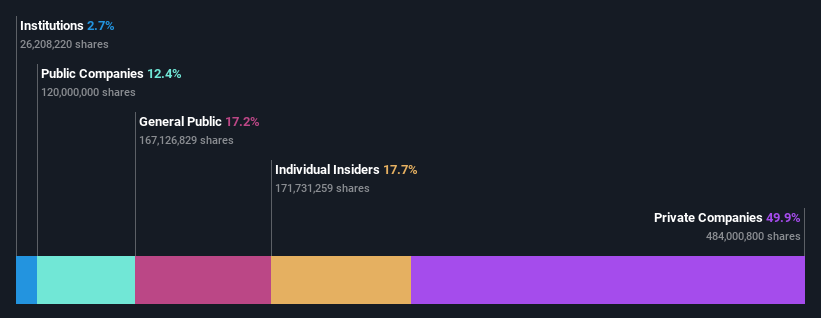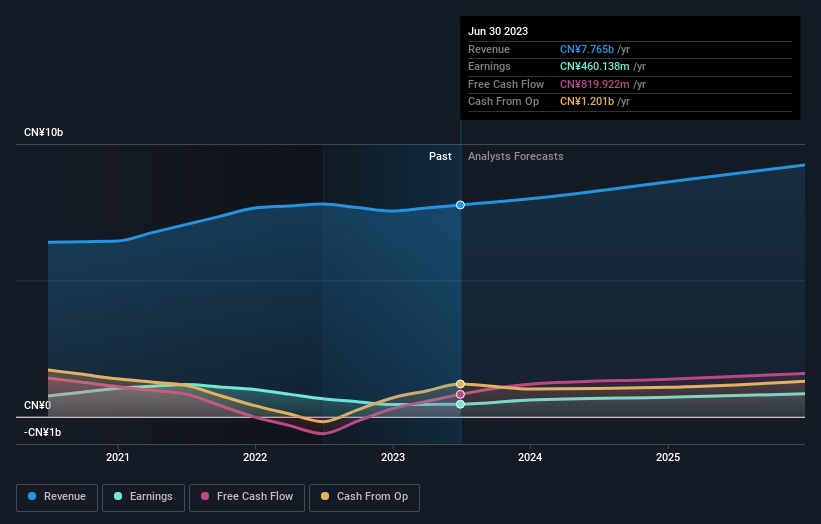- Hong Kong
- /
- Gas Utilities
- /
- SEHK:1600
Tian Lun Gas Holdings Limited's (HKG:1600) market cap rose HK$388m last week; private companies who hold 50% profited and so did insiders

Key Insights
- Significant control over Tian Lun Gas Holdings by private companies implies that the general public has more power to influence management and governance-related decisions
- 61% of the business is held by the top 2 shareholders
- Insider ownership in Tian Lun Gas Holdings is 18%
A look at the shareholders of Tian Lun Gas Holdings Limited (HKG:1600) can tell us which group is most powerful. The group holding the most number of shares in the company, around 50% to be precise, is private companies. Put another way, the group faces the maximum upside potential (or downside risk).
While private companies were the group that benefitted the most from last week’s HK$388m market cap gain, insiders too had a 18% share in those profits.
Let's take a closer look to see what the different types of shareholders can tell us about Tian Lun Gas Holdings.
Check out our latest analysis for Tian Lun Gas Holdings

What Does The Institutional Ownership Tell Us About Tian Lun Gas Holdings?
Institutions typically measure themselves against a benchmark when reporting to their own investors, so they often become more enthusiastic about a stock once it's included in a major index. We would expect most companies to have some institutions on the register, especially if they are growing.
Since institutions own only a small portion of Tian Lun Gas Holdings, many may not have spent much time considering the stock. But it's clear that some have; and they liked it enough to buy in. If the business gets stronger from here, we could see a situation where more institutions are keen to buy. It is not uncommon to see a big share price rise if multiple institutional investors are trying to buy into a stock at the same time. So check out the historic earnings trajectory, below, but keep in mind it's the future that counts most.

Tian Lun Gas Holdings is not owned by hedge funds. The company's largest shareholder is Gold Shine Development Limited, with ownership of 49%. With 12% and 8.7% of the shares outstanding respectively, Zhuhai Port Co.,Ltd. and Yingcen Zhang are the second and third largest shareholders. Yingcen Zhang, who is the third-largest shareholder, also happens to hold the title of Chairman of the Board. Furthermore, CEO Zhenyuan Xian is the owner of 0.9% of the company's shares.
After doing some more digging, we found that the top 2 shareholders collectively control more than half of the company's shares, implying that they have considerable power to influence the company's decisions.
While it makes sense to study institutional ownership data for a company, it also makes sense to study analyst sentiments to know which way the wind is blowing. There is a little analyst coverage of the stock, but not much. So there is room for it to gain more coverage.
Insider Ownership Of Tian Lun Gas Holdings
The definition of company insiders can be subjective and does vary between jurisdictions. Our data reflects individual insiders, capturing board members at the very least. The company management answer to the board and the latter should represent the interests of shareholders. Notably, sometimes top-level managers are on the board themselves.
I generally consider insider ownership to be a good thing. However, on some occasions it makes it more difficult for other shareholders to hold the board accountable for decisions.
Our most recent data indicates that insiders own a reasonable proportion of Tian Lun Gas Holdings Limited. It has a market capitalization of just HK$3.8b, and insiders have HK$675m worth of shares in their own names. We would say this shows alignment with shareholders, but it is worth noting that the company is still quite small; some insiders may have founded the business. You can click here to see if those insiders have been buying or selling.
General Public Ownership
The general public-- including retail investors -- own 17% stake in the company, and hence can't easily be ignored. This size of ownership, while considerable, may not be enough to change company policy if the decision is not in sync with other large shareholders.
Private Company Ownership
Our data indicates that Private Companies hold 50%, of the company's shares. Private companies may be related parties. Sometimes insiders have an interest in a public company through a holding in a private company, rather than in their own capacity as an individual. While it's hard to draw any broad stroke conclusions, it is worth noting as an area for further research.
Public Company Ownership
Public companies currently own 12% of Tian Lun Gas Holdings stock. We can't be certain but it is quite possible this is a strategic stake. The businesses may be similar, or work together.
Next Steps:
I find it very interesting to look at who exactly owns a company. But to truly gain insight, we need to consider other information, too. To that end, you should learn about the 2 warning signs we've spotted with Tian Lun Gas Holdings (including 1 which is a bit concerning) .
If you would prefer discover what analysts are predicting in terms of future growth, do not miss this free report on analyst forecasts.
NB: Figures in this article are calculated using data from the last twelve months, which refer to the 12-month period ending on the last date of the month the financial statement is dated. This may not be consistent with full year annual report figures.
Valuation is complex, but we're here to simplify it.
Discover if Tian Lun Gas Holdings might be undervalued or overvalued with our detailed analysis, featuring fair value estimates, potential risks, dividends, insider trades, and its financial condition.
Access Free AnalysisHave feedback on this article? Concerned about the content? Get in touch with us directly. Alternatively, email editorial-team (at) simplywallst.com.
This article by Simply Wall St is general in nature. We provide commentary based on historical data and analyst forecasts only using an unbiased methodology and our articles are not intended to be financial advice. It does not constitute a recommendation to buy or sell any stock, and does not take account of your objectives, or your financial situation. We aim to bring you long-term focused analysis driven by fundamental data. Note that our analysis may not factor in the latest price-sensitive company announcements or qualitative material. Simply Wall St has no position in any stocks mentioned.
About SEHK:1600
Tian Lun Gas Holdings
Engages in the transportation, distribution, and sale of natural gas and compressed natural gas through its gas pipeline connections in the People’ Republic of China.
Undervalued with acceptable track record.

